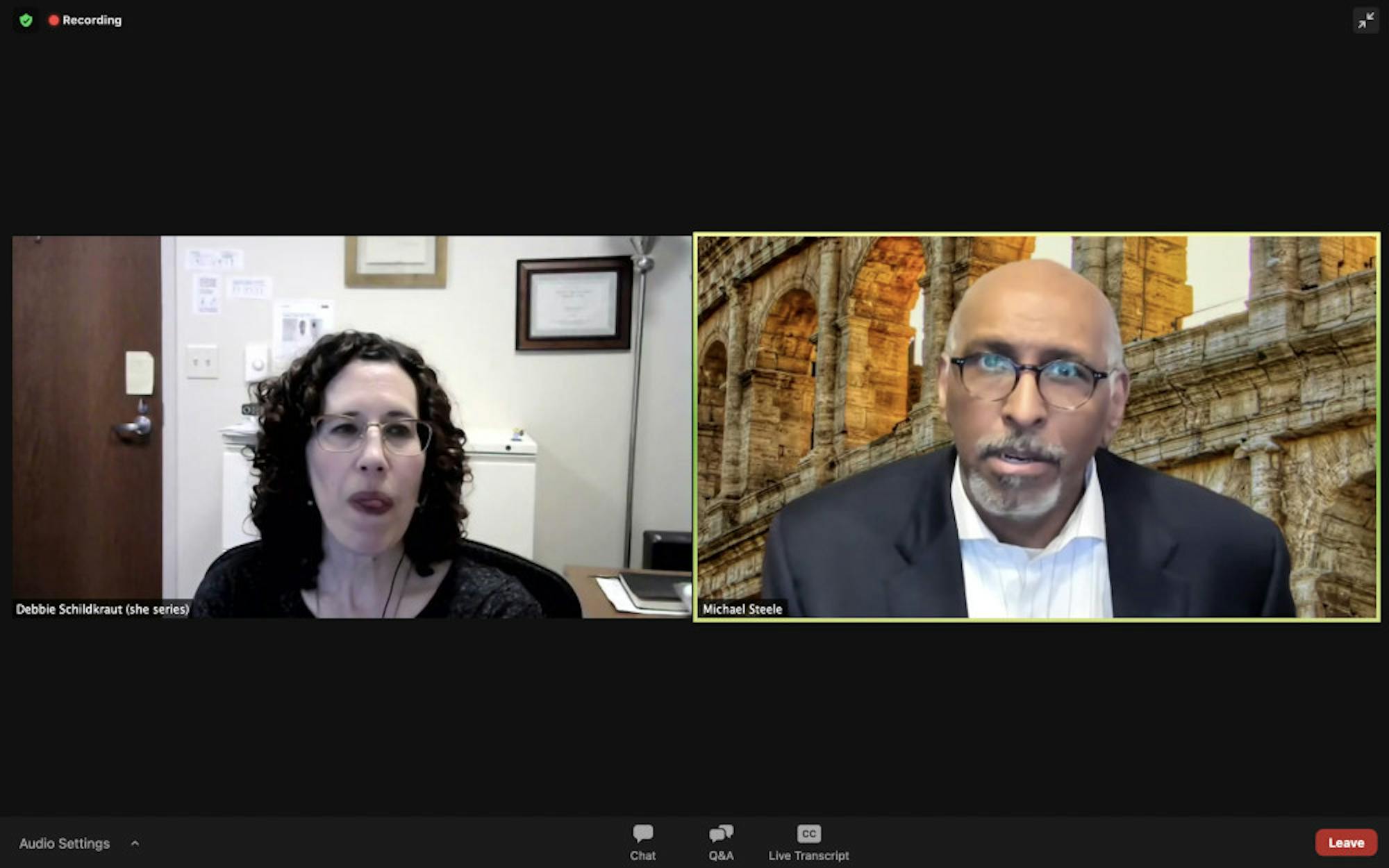The Jonathan M. Tisch College of Civic Life hosted the latest event in its Distinguished Speaker Series, a conversation with Michael Steele, on April 1. Steele was the first African American elected to statewide office in Maryland, where he was lieutenant governor from 2003 to 2007; the chairperson of the Republican National Committee from 2009 until 2011; and is now a political analyst at MSNBC.
Tisch College Dean Alan Solomont (A’70) delivered opening remarks and provided context for Steele’s impactful political career, explaining why he believes Steele is qualified to speak on some of the most important and complicated questions the nation is facing.
"One of those questions is certainly about the future of the conservative movement and the Republican Party," Solomont said. "And today's guest is uniquely qualified to provide some insight and perspective to that question."
Solomont then introduced Deborah Schildkraut, a professor in the department of political science, as the event moderator.
“[Professor Schildkraut] is an expert on American politics and psychology," Solomont said. "At Tufts, she teaches courses like the politics of ethnicity and American identity, political psychology, public opinion and political representation in the United States."
Schildkraut first brought up Steele's childhood, noting that he grew up as a devout Catholic and studied for the priesthood. She asked what led him to his positions in politics and the Republican Party.
Steele said his religious upbringing was a big contributor to his future career.
"It was grounding, it was very, very important," Steele said. "It set for me how I would ultimately come to view the world and how I would experience the world, how I find the water's edge where things are not any longer political but they're, in fact, about people."
Schildkraut then asked about Steele’s upbringing in a “monolithic Democratic community” and Democratic family, inquiring how he moved to the Republican side of the spectrum as an adult.
“My mom told me to be an independent thinker,” Steele said. “Now that’s a blessing and a curse, to be honest.”
He discussed his investigation of the history of party politics.
"For over 100 years, African Americans voted for Republicans the way they vote for Democrats today," Steele said. "I wanted to understand that more. So I realized that it was Black ideas and Black hands and Black politics that helped shape this new-forming party that was born out of the Whigs, known as the Republicans."
Schildkraut asked about how Steele has overcome the impact of threats and hateful messages as a public figure. He offered advice to those interested in a career in politics, especially students.
“If you don’t know who you are, don’t get in this game," Steele said. "If you're not ready to shut up and listen to what people around you are saying, you will never learn and, therefore, you will never grow, and, therefore, you will never be that good leader you want to be."
He spoke further on the traits of a good leader.
"Always be prepared to lead, but never be afraid to follow," Steele said.
Schildkraut next focused on Steele’s criticism of former president Donald Trump from within the Republican Party.
"When I criticized Donald Trump, I didn't really care what anybody else inside the party thought about that because I was sharing my conviction," Steele said. "I was sharing my voice, just as [Trump-supporting Republicans] were sharing their support: 'Yeah, anything Trump wants to do, we're there.'"
Steele disagreed with the practice of blindly following the leader of the party you support. "This is not about one man, nor should it be," Steele said. "It's not about the party. It's about the country I live in."
Steele said he believes there is an existential crisis in the Republican Party right now. “I’ve been advocating for 20 plus years … we have to recognize where this trend line is going," Steele said.
He noted that many states that were once solidly red are shifting.
"You may be [red] today, but you won't be in 10 years," Steele said. "Virginia, check; North Carolina, on the bubble; Georgia, 2024, mark my words. Texas is a battleground state, and I will be surprised if the Republicans hold on and keep it."
Steele also answered several questions posed directly by audience members before Schildkraut summarized other questions coming in, one of which was about the future of the Republican Party with respect to African American voters.
Steele was not hopeful.
“Unless you can address what we see unfolding right now in the Chauvin trial, unless you can get behind and understand the angst around Black Lives Matter and why it came into being in the first place … then you haven’t begun to scratch the surface," Steele said.
The event ended with a question asking whether Steele is optimistic that the Republican Party will do the work he has suggested to engage with African American voters.
“Not at this moment," Steele said. "I’m waiting for a leader to make the sacrifice, to do the course correct.”






